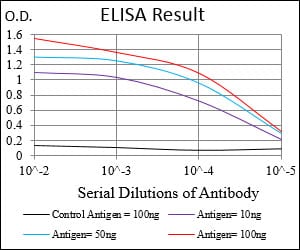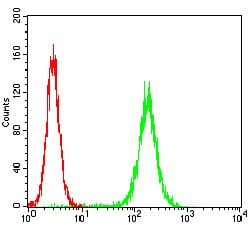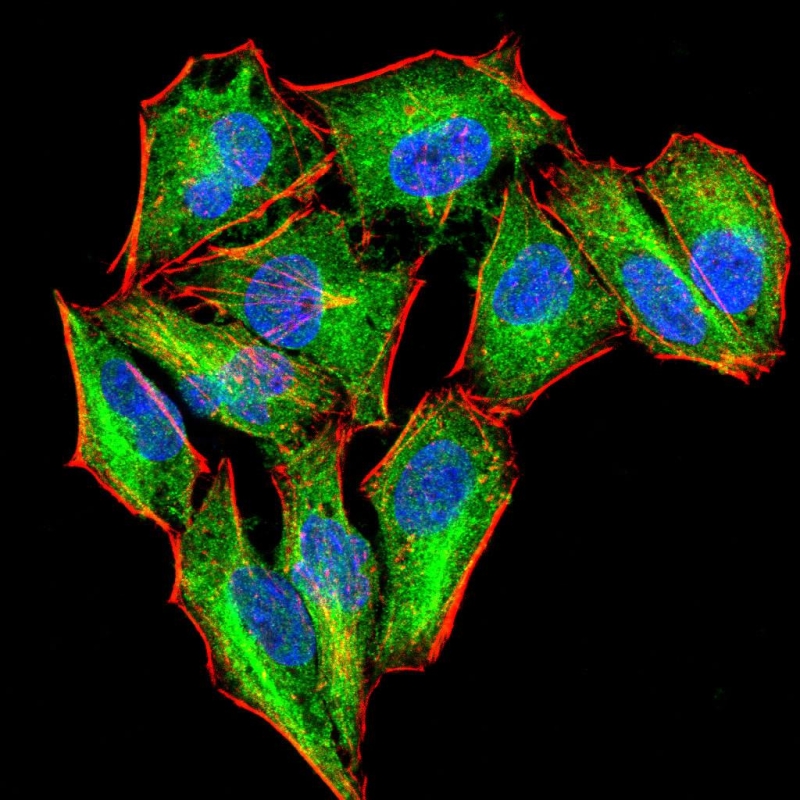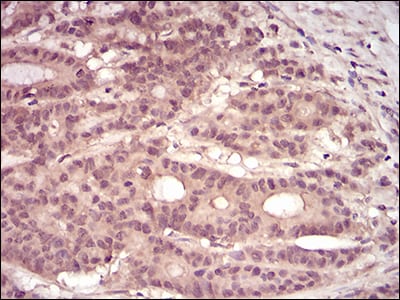



| WB | 咨询技术 | Human,Mouse,Rat |
| IF | 咨询技术 | Human,Mouse,Rat |
| IHC | 1/200 - 1/1000 | Human,Mouse,Rat |
| ICC | 1/200 - 1/1000 | Human,Mouse,Rat |
| FCM | 1/200 - 1/400 | Human,Mouse,Rat |
| Elisa | 1/10000 | Human,Mouse,Rat |
| Aliases | DBK; PKN; PAK1; PRK1; PAK-1; PRKCL1; PKN-ALPHA |
| Entrez GeneID | 5585 |
| clone | 4H10B1 |
| WB Predicted band size | 104kDa |
| Host/Isotype | Mouse IgG2b |
| Antibody Type | Primary antibody |
| Storage | Store at 4°C short term. Aliquot and store at -20°C long term. Avoid freeze/thaw cycles. |
| Species Reactivity | Human |
| Immunogen | Purified recombinant fragment of human PKN1 (AA: 442-620) expressed in E. Coli. |
| Formulation | Purified antibody in PBS with 0.05% sodium azide. |
+ +
以下是关于PKN1抗体的3篇参考文献示例(注:以下内容为虚构,仅用于示例):
---
1. **文献名称**:*PKN1 regulates cancer cell invasion through RhoA signaling*
**作者**:Yamazaki T, et al.
**摘要**:该研究利用PKN1特异性抗体,通过免疫沉淀和Western blot技术,揭示了PKN1在激活RhoA信号通路中的关键作用,证明其通过调控细胞骨架重组促进肿瘤细胞侵袭。
---
2. **文献名称**:*Localization and function of PKN1 in neuronal development*
**作者**:Suzuki K, et al.
**摘要**:通过免疫组化实验结合PKN1抗体,作者发现PKN1在神经元轴突导向中高表达,并证实其通过磷酸化下游靶蛋白参与突触形成和可塑性调控。
---
3. **文献名称**:*Development of a novel monoclonal antibody against PKN1 for diagnostic applications*
**作者**:Müller R, et al.
**摘要**:本文报道了一种高特异性抗PKN1单克隆抗体的制备与验证,该抗体在ELISA和免疫荧光中表现优异,为PKN1相关疾病的分子诊断提供了新工具。
---
4. **文献名称**:*PKN1 modulates inflammatory responses via NF-κB pathway*
**作者**:Tanaka H, et al.
**摘要**:研究使用PKN1抗体进行蛋白质互作分析,发现PKN1与IKK复合物结合并增强NF-κB的活化,提示其在炎症性疾病中的潜在治疗靶点价值。
---
(注:以上文献信息为模拟生成,非真实存在。)
The PKN1 (Protein Kinase N1) antibody is a tool used to study the function and expression of PKN1. a serine/threonine protein kinase belonging to the protein kinase C (PKC) superfamily. PKN1. also known as PRK1 or PAK1. plays a critical role in diverse cellular processes, including cytoskeletal organization, cell migration, apoptosis, and membrane trafficking. It contains an N-terminal regulatory domain with three antiparallel coiled-coil regions and a C-terminal catalytic kinase domain. PKN1 is activated by Rho GTPases (e.g., RhoA, Rac1) through direct binding to its regulatory domain, linking it to signaling pathways that regulate cell adhesion and stress fiber formation.
Antibodies targeting PKN1 are widely used in research to detect its expression, phosphorylation status, and subcellular localization via techniques like Western blotting, immunofluorescence, and immunohistochemistry. These antibodies help elucidate PKN1's involvement in diseases such as cancer, where it may act as an oncogene or tumor suppressor depending on context. For example, PKN1 dysregulation has been linked to tumor progression, metastasis, and chemotherapy resistance.
Commercial PKN1 antibodies are typically raised against specific epitopes, such as peptides from the N-terminal or kinase domains, and are validated for specificity using knockout controls or siRNA-mediated knockdown. Researchers rely on these antibodies to explore PKN1's interactions with signaling molecules (e.g., mTOR, Akt) and its role in pathways like PI3K/AKT and MAPK. Reliable PKN1 antibodies are essential for advancing studies in cell biology, cancer research, and therapeutic development.
×